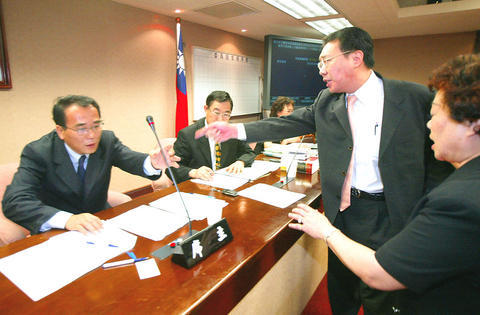The legislative Home and Nations Committee meeting adjourned early yesterday amid a near brawl and shouting by lawmakers over an amendment proposing to lift the ban on Taiwanese investment in high-tech items in China.
Chinese Nationalist Party (KMT) Legislator Lee Chi-chu (李紀珠) introduced an amendment to the Statute Governing Relations between the Peoples of the Taiwan Area and Mainland Area (台灣地區與大陸地區人民關係條例) that called for the lifting of restrictions on relocating certain technologies and materials from Taiwan to China.
The bill sparked immediate bickering between ruling and opposition party lawmakers.

PHOTO: CNA
The verbal sparring almost became physical when Taiwan Solidarity Union Legislator David Huang (黃適卓) discovered that executives from the electronics, semiconductor and petroleum sectors -- including Taiwan Semiconductor Manufacturing Co (TSMC), the world's largest contract chipmaker -- were in attendance.
Pounding a desk and screaming, Huang accused the committee convener, Non-Partisan Solidarity Union Legislator Tsai Hau (蔡豪), of ambushing pan-green lawmakers opposed to the bill by secretly inviting the executives to the meeting to influence its outcome.
"The KMT doesn't love Taiwan," Huang shouted. "It's trying to sell us out to China!"
"I'll be waiting outside the legislature for you later," Tsai threatened. "How about that?"
Sponsored by 44 pan-blue lawmakers, the bill seeks to alter Article 35 of the statute by allowing Taiwan-based businesses to relocate technologies related to mass production, especially of high-tech products, to China as long as the technologies are already in China and such transfers don't violate international rules on trade and transfers.
The bill would allow chipmakers to use 0.18-micron technology to manufacture chips in China, while other high-tech companies could transfer a range of now restricted components, including liquid-crystal-display panels, to China to ramp up mass production there, according to a Mainland Affairs Council statement.
The bill would lead to a disproportionate amount of investment flowing to China and a further hollowing out of the economy as the nation's production and technology shift to China, the council warned.
Local chipmakers are allowed to transfer currently restricted 0.18-micron technology to China to produce eight to 12-inch wafer fabs there, as long as the Ministry of Economic Affairs approves such transfers. However, the application process is typically long and arduous.
The council's statement also included a long list of restricted items, including chemical and biological agents and other sensitive technologies, that even Lee acknowledged should, "for the sake of national security, be subject to some restrictions on cross-strait investment and technical cooperation."
The 102 restricted items, the council said in its statement, account for a mere 1.42 percent of investment by the local manufacturing sector, and could have military applications. To date, Taiwan has already invested US$57.5 billion in China, a market now home to more than 55 percent of Taiwan's total overseas investment, it added.
"Overseas investment is already too concentrated in China, and that has led to some negative impact [on the nation]," it said.
The message from pan-blue lawmakers yesterday, however, was just the opposite.
"This bill is vital to give our manufacturers an edge and increase the nation's economic competitiveness," Lee said.
Current rules on technology transfers, the bill's sponsors said in a statement, are vague, outdated and the reason behind local businesses' losing out on vital market opportunities in China as the nation slips further into economic "malaise."

Taiwan is stepping up plans to create self-sufficient supply chains for combat drones and increase foreign orders from the US to counter China’s numerical superiority, a defense official said on Saturday. Commenting on condition of anonymity, the official said the nation’s armed forces are in agreement with US Admiral Samuel Paparo’s assessment that Taiwan’s military must be prepared to turn the nation’s waters into a “hellscape” for the Chinese People’s Liberation Army (PLA). Paparo, the commander of the US Indo-Pacific Command, reiterated the concept during a Congressional hearing in Washington on Wednesday. He first coined the term in a security conference last

Prosecutors today declined to say who was questioned regarding alleged forgery on petitions to recall Democratic Progressive Party (DPP) legislators, after Chinese-language media earlier reported that members of the Chinese Nationalist Party (KMT) Youth League were brought in for questioning. The Ministry of Justice Investigation Bureau confirmed that two people had been questioned, but did not disclose any further information about the ongoing investigation. KMT Youth League members Lee Hsiao-liang (李孝亮) and Liu Szu-yin (劉思吟) — who are leading the effort to recall DPP caucus chief executive Rosalia Wu (吳思瑤) and Legislator Wu Pei-yi (吳沛憶) — both posted on Facebook saying: “I

The Ministry of Economic Affairs has fined Taobao NT$1.2 million (US$36,912) for advertisements that exceed its approved business scope, requiring the Chinese e-commerce platform to make corrections in the first half of this year or its license may be revoked. Lawmakers have called for stricter enforcement of Chinese e-commerce platforms and measures to prevent China from laundering its goods through Taiwan in response to US President Donald Trump’s heavy tariffs on China. The Legislative Yuan’s Finance Committee met today to discuss policies to prevent China from dumping goods in Taiwan, inviting government agencies to report. Democratic Progressive Party Legislator Kuo Kuo-wen (郭國文) said

Sung Chien-liang (宋建樑), who led efforts to recall Democratic Progressive Party (DPP) Legislator Lee Kun-cheng (李坤城), was released on bail of NT$80,000 today amid outcry over his decision to wear a Nazi armband to questioning the night before. Sung arrived at the New Taipei District Prosecutors’ Office for questioning in a recall petition forgery case last night wearing a red armband bearing a swastika, carrying a copy of Adolf Hitler’s Mein Kampf and giving a Nazi salute. Sung left the building at 1:15am without the armband and covering the book with his coat. Lee said today that this is a serious